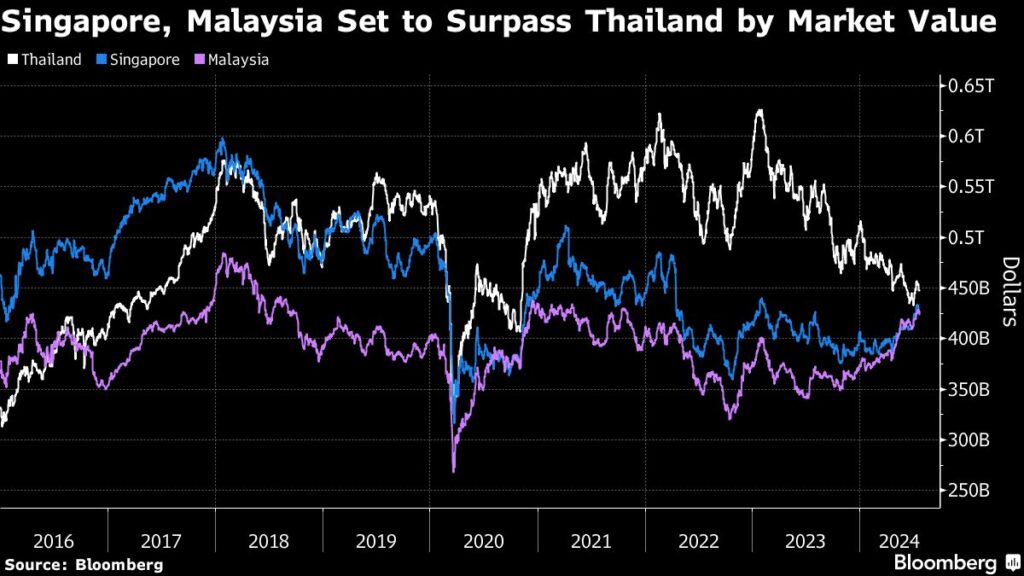(Bloomberg) — For years, Thai equities stood tall as one of Southeast Asia’s largest stock markets. That bullish story is fast unraveling, and not even cheap valuations can save the day.
Most Read from Bloomberg
The nation is set to lose its longstanding No. 2 spot in market capitalization to rivals Singapore and Malaysia, according to data compiled by Bloomberg. The gap between Thailand and Singapore is about $14 billion versus $125 billion a year ago.
Thailand’s precipitous drop is the result of a combination of political and legal flip-flops, weaker-than-expected tourism spending and allegations of corporate misconduct. Those factors have spurred a 14% selloff in the benchmark Stock Exchange of Thailand Index over the last 12 months, the biggest fall among major benchmarks globally.
“The market is likely to remain a value trap until the economic and corporate earnings growth outlook improves,” said Alan Richardson, a fund manager at Samsung Asset Management Co.
The total value of companies traded on Thailand exchanges was about $440 billion through Thursday, a small lead compared to $426 billion for Singapore and $422 billion for Malaysia, the data show. Indonesia’s stock market, valued at about $749 billion, has been the region’s largest the vast majority of the time since late 2021.
Things weren’t supposed to be this way. When Thailand finally relaxed their pandemic-era restrictions back in late 2022, investors assumed that the influx of tourists would revive its ailing economy. Instead, China’s draconian Covid restrictions and a weak macro economy resulted in fewer travelers from the country — who made up more than one-quarter of total visitors in 2019 — and less spending.
Foreign Investors Flee Thai Stocks, Fueling World’s Biggest Drop
Political instability related to whether Prime Minister Srettha Thavisin will be removed from office and policy delays including a yet-to-be-paid $14-billion cash handout are also weighing on market sentiment.
To revive market confidence, Thailand’s bourse has launched a series of new initiatives, including reforms to prevent any market abuses and improve efficiency, according to exchange President Pakorn Peetathawatchai.
Global traders aren’t yet convinced. Overseas investors have offloaded nearly $3.3 billion worth of stocks so far this year, according to Bloomberg data. That’s on track to match last year’s decline, which was the biggest dip since 2020. They’ve added $85 million in exposure to Malaysia, the only country with year-to-date inflows within Southeast Asia. In Singapore, foreigners trimmed their selling to just a tiny fraction relative to last year, according to EPFR data.
“The baht has been weak and the fiscal discipline has been lost with this new government’s handouts,” said Sat Duhra, a fund manager at Janus Henderson Group Plc. “There are far better opportunities in Asia.”
Thai stocks typically trade at a premium to their Malaysian counterparts. But in late May, the average 12-month forward price-to-earnings ratio on the SET Index became cheaper than the FTSE Bursa Malaysia KLCI Index for the first time in nearly four years. The SET now trades at about 13 times compared with 14.1 times for its rival.
National market capitalizations calculated by Bloomberg include only actively traded, primary securities on a country’s exchanges to avoid double counting — often resulting in lower values from other sources. The data exclude ETFs and ADRs as they do not directly represent companies. By some accounts, Singapore’s market cap has already surpassed Thailand’s, according to the most recent data available via the two exchanges.
Part of the gain in Singapore’s market value is thanks to banking stocks, which have notched fresh highs recently on dividend expectations and higher interest rates. That’s lifted the Straits Times Index up about 6% this year.
Malaysia’s AI Push Lures Stock Investors After Years of Outflows
Meanwhile, traders have bid up Malaysia’s market on account of the artificial-intelligence frenzy given its position as an AI data center and chip supply-chain hub. The KLCI Index is up 11% this year, the strongest in the region.
Looking forward, Thailand’s prospects look a bit foggy, particularly as any political developments may take some time to unwind. The “political and policy certainty are the catalysts for macro improvements which may then bring back foreign investors,” said Kenneth Tang, a senior portfolio manager at Nikko Asset Management.
–With assistance from John Cheng and Jiyeun Lee.
Most Read from Bloomberg Businessweek
©2024 Bloomberg L.P.
Read the full article here

